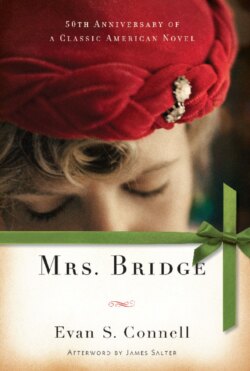Читать книгу Mrs. Bridge - Evan S. Connell - Страница 11
На сайте Литреса книга снята с продажи.
Оглавление5 • CHRISTMAS BASKET
That there should be those who had marmalade, and those who did not, was a condition that appealed to Carolyn. She looked forward to Christmas, at which time the newspaper printed a list of the one hundred neediest families in Kansas City. Every year Mrs. Bridge adopted one of these families, seeing to it that they had a nice holiday, and Carolyn now took a definite interest in this annual project. Each needy family was described in the paper—how many children, how old, what they needed particularly, and so forth—and Carolyn helped her mother decide which family they should adopt. Ruth and Douglas did not seem to care very much.
A bushel basket, or perhaps two, would be filled with canned goods, possibly some clothing, and whatever else the poor family could obviously use—a smoked ham, a bag of flour, a bag of salt—and the basket would then be topped with candy canes and a paper angel or a Santa Claus, and the edges trimmed with scallops of red and green crepe. Then on the day before Christmas Mrs. Bridge and the children would deliver the basket to the address furnished by the newspaper.
During the preparations Mrs. Bridge would sometimes ask the children if they could remember the family they had adopted last year. Ruth, being the oldest, usually could, but it was always Carolyn who could describe most sharply the details of poverty.
Douglas, possibly because he was so young—or so Mrs. Bridge reasoned—did not enjoy these trips. Each Christmas when he saw the basket being filled and trimmed he grew restless and obstinate; she did not know why, nor could she get him to explain. He did not want to go, that was clear, but she wanted him to appreciate his own good fortune, and not to grow up thinking he was better than someone else, so she insisted he go along to visit the poor family; he would ride in the back seat of the Reo with one arm resting on top of the Christmas basket, and he never said a word from the moment the trip started until they were home again. But he, like Ruth, remembered. This was why he hated to go. He could remember the very first visit. He had been just three years old when he first joined his sisters on the annual expedition to the north end of the city—had it been to Strawberry Hill, where he had expected to see a bowl of strawberries on top of the hill?—no matter, he remembered how he had been sitting in the back of the Reo when the door was opened and a man leaned in and took the basket away. Then, while the door was still open and snowflakes were falling on his knees, someone else leaned in—he could not remember whether it was a man or a woman—and quickly, neatly touched the cushion of the Reo.
Although many years were to pass before Douglas could understand why someone had wanted to touch the cushion, or why the memory of that gesture should persist, each Christmas thereafter when he saw the basket being filled and trimmed he grew restless and obstinate.
